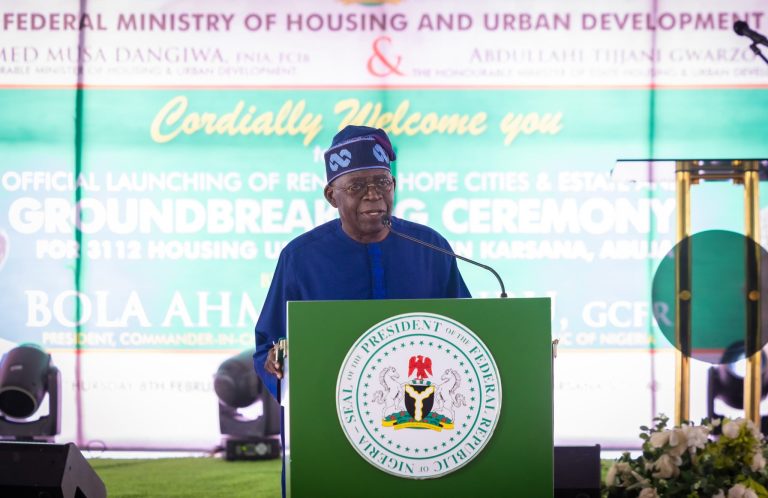President Bola Tinubu officially launched the Renewed Hope Cities and Estates programme by conducting the groundbreaking ceremony for a 3,112 housing unit project in Abuja on Thursday.
The announcement was made via the Nigerian Television Authority’s official X handle.
Earlier, Nairametrics reported that on Thursday, February 8, 2024, President Bola Tinubu was scheduled to flag off the construction of the 3,112 housing unit project in Karsana District, Phase 3, Federal Capital Territory, as a component of the Renewed Hope Cities and Estates programme.
During the groundbreaking ceremony, President Tinubu underscored that the 3,112 housing units planned for Abuja’s Renewed Hope City serve as a testament to his administration’s belief that every Nigerian deserves affordable and decent accommodation.
- “My administration believes that every Nigerian deserves to have access to shelter that is affordable and adequate.
- “At 25 direct and indirect jobs per house, the 20,000 housing units planned for the Federal Capital Territory alone will create 500,000 jobs,” President Tinubu said.
What you should know about the Renewed Hope Cities and Estates programme:
- In a bid to tackle the pressing issue of housing deficit, President Tinubu took decisive action by authorizing N100 billion for the Ministry of Housing and Urban Development in the 2023 Supplementary budget. Additionally, N18.9 billion has been allocated in the 2024 budget for the implementation of the Renewed Hope Cities and Estates project, alongside Urban and Slum Upgrading programmes.
- Nairametrics earlier reported that the Renewed Hope Cities and Estates Programme, a crucial component of a Public-Private Partnership established in December 2023, aims to address the housing deficit in Nigeria by constructing a total of 100,000 housing units nationwide.
- This ambitious endeavor is a collaborative effort between the Ministry and a consortium of reputable companies, namely Continental Civil and General Construction Limited and Ceezali Limited.
- Under the leadership of the Minister of Housing and Urban Development, Arc. Musa Dangiwa, Land Allocation Requests have been issued to all states for the Renewed Hope Cities and Estates Programme. States are urged to provide a minimum of 50 hectares of land in proximity to their respective state capitals to facilitate this initiative.
- The initial phase of the Renewed Hope Cities and Estates Programme is set to kick off with the construction of 20,000 housing units in the Federal Capital Territory (FCT). Of these, 3,112 units are designated for construction at the Karsana site, marking a significant step towards addressing the housing needs of Nigerians.
- Each Renewed Hope City is planned to incorporate a minimum of 1,000 housing units per site within a single location in each of the six geopolitical zones of Nigeria, including the Federal Capital Territory (FCT).
- The Renewed Hope Estates, on the other hand, are anticipated to include a minimum of 500 housing units per site across the remaining thirty (30) states.
- These Renewed Hope Cities and Estates are envisioned as inclusive residential communities designed to accommodate a diverse range of income levels. They will feature one-bedroom, two-bedroom, and three-bedroom apartment blocks tailored for low to medium-income earners, as well as two-bedroom terraces, four-bedroom terraces, four-bedroom duplexes, and five-bedroom duplexes catered to high-income individuals.
- The Ministry of Housing and Urban Development is set to initiate several Public-Private Partnership (PPP) projects as part of the Renewed Hope Cities and Estates program. These projects encompass 2,500 housing units in Renewed Hope City at Ibeju-Lekki Coastal City, Lagos, a 500-unit Renewed Hope Estate in Kano, and 250 housing units distributed across twelve states. Additionally, two Renewed Hope Estates will be established in each geopolitical zone: Ogun, Oyo, Akwa Ibom, Delta, Abia, Ebonyi, Nasarawa, Benue, Yobe, Gombe, Katsina, and Sokoto.
- The Renewed Hope Cities and Estates programme is structured as a cross-subsidy initiative, with 80% of the housing units sold at commercial rates and the remaining 20% offered at concessional rates to low- and medium-income Nigerians affiliated with the Nigeria Labour Congress and the Trade Union Congress.
- This cross-subsidy model aims to utilize profits generated from the commercial units to subsidize the units designated for low- and medium-income earners.
- Several ownership avenues are accessible to Nigerians under the Renewed Cities and Estate Programme, aimed at improving housing affordability. These options include single-digit, 30-year mortgage loans facilitated by the Federal Mortgage Bank of Nigeria, Rent-to-Own schemes allowing beneficiaries to reside in properties and contribute towards ownership through periodic payments, and Outright Purchase options tailored for high-income earners.
- The Ministry of Housing and Urban Development is spearheading initiatives to establish a conducive environment and will aid in facilitating access for potential homeowners drawn from participants in the National Housing Fund (NHF) Scheme. This scheme is overseen by the Federal Mortgage Bank of Nigeria (FMBN), an agency operating under the Ministry’s jurisdiction.

